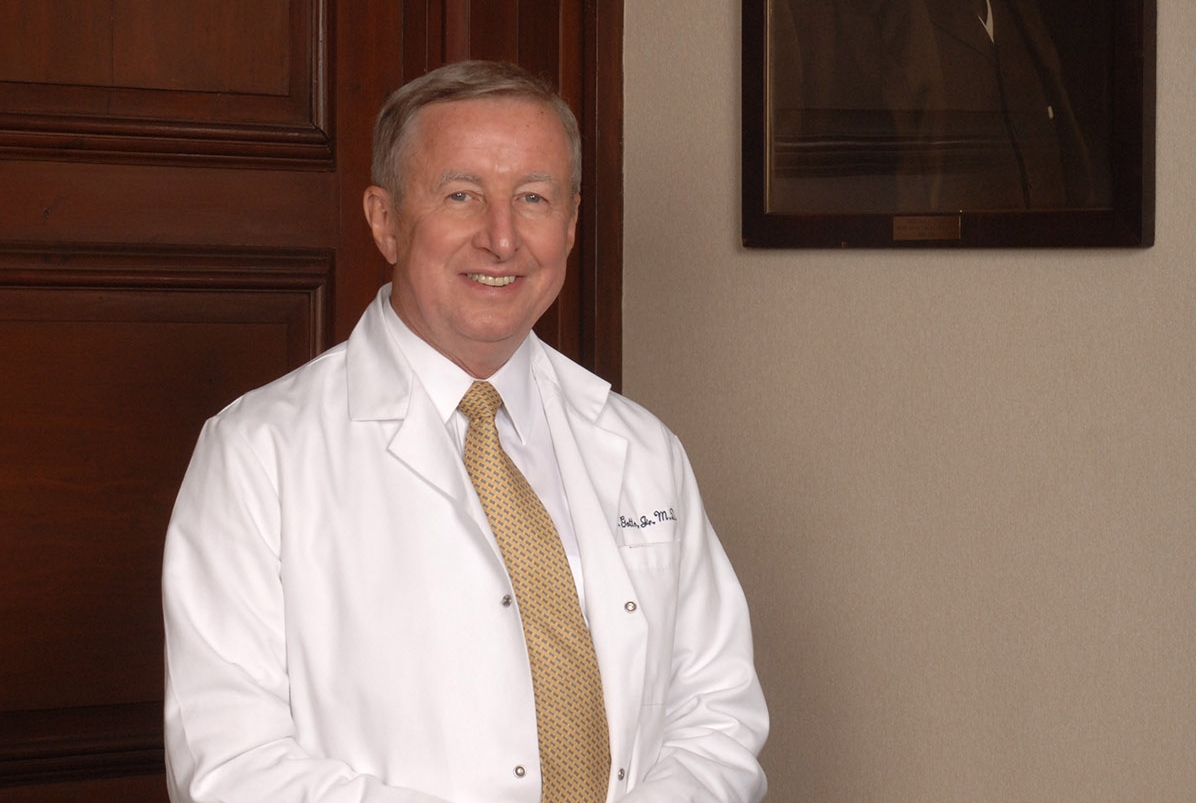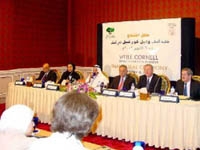
Participating in the press conference held on Oct. 6 were (from right) Dr. Daniel Alonso, dean of Weill Cornell Medical College in Qatar; Dr. Antonio Gotto, provost for medical affairs for Cornell University and dean of Weill Cornell Medical College in New York; Sanford Weill, chairman of Weill Cornell's Board of Overseers; His Excellency Hajar A. Hajar, M.D., Qatar Minister of Public Health; and Sheikha bint Abdullah Al-Missned, Ph.D., and Mohammad Fathy Saoud, Ph.D., members of the Board of Directors of the Qatar Foundation for Education, Science and Community Development.
The historic opening of Weill Cornell Medical College in Qatar was celebrated with an inaugural program and press conference held on Oct. 6 at Education City in Qatar's capital city, Doha, attracting worldwide attention as an example of international collaboration. The celebration marked the beginning of classes in September for 27 students enrolled in the first class of the two-year Pre-Medical Program.
Leading the celebration was the Emir of Qatar, His Highness Sheikh Hamad bin Khalifa Al-Thani, and Her Highness Sheikha Mouza bint Nasser Al-Misnad, who chairs the Qatar Foundation for Education, Science and Community Development and who is also a member of Weill Cornell's Board of Overseers.
Representing Cornell University and Weill Cornell were Dr. Antonio Gotto, provost for medical affairs for Cornell University and dean of Weill Cornell Medical College in New York; Sanford Weill, chairman of Weill Cornell's Board of Overseers; Dr. Daniel Alonso, dean of Weill Cornell Medical College in Qatar (WCMC-Q); Barbara Friedman, a Cornell University trustee and a Weill Cornell overseer; and Steven Rosalie, Weill Cornell associate provost.
Dr. Jordan Cohen, president of the Association of American Medical Colleges (AAMC), made the keynote address at the inaugural celebration.
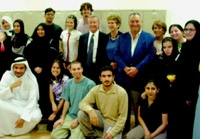
Pre-medical students surround Dr. Gotto and Sanford and Joan Weill during their visit to WCMC-Q for the inaugural celebration.
Other participants included members of the Emir's family and cabinet; ministers of education from the region; WCMC-Q faculty, staff, students and their families; diplomats; and other distinguished local and regional guests.
Through the shared vision of the Qatar Foundation and Cornell University in establishing the Weill Cornell Medical College in Qatar, "I believe we offer the world a model of cooperation and an example of healthy globalization," said Her Highness Sheikha Mouza bint Nasser Al-Misnad. As chairperson of the Qatar Foundation, Sheikha Mouza has led initiatives to bring the highest quality educational opportunities to the people of Qatar and the Gulf region.
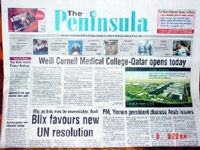
The opening of Weill Cornell Medical College in Qatar received wide local and regional press coverage, including the major English-language and Arabic newspaper, TV, and Internet media outlets. In addition, members of the foreign press representing Reuters, Financial Times, Time magazine, and CNN visited WCMC-Q to film students in classes and laboratories.
"Weill Cornell Medical College in Qatar truly extends Cornell's standards, quality and mission into the world," said Dr. Gotto. "This institution will have the same standards central to Cornell's heritage. It will contribute in a direct way to the aspirations and needs of the people of Qatar and of the region."
"The significance of this venture goes far beyond the many clear advantages it promises to bring to the health and welfare of Qataris and the people of this region," said AAMC president Dr. Cohen. "Its broader significance lies in the groundbreaking example of global cooperation that our shrinking world so desperately needs at this especially troubling time in our interdependent history."
"My wife, Joan, and I are deeply impressed by the dedication and enthusiasm of the students enrolled in the Pre-Medical Program," said Mr. Weill. "We are proud to be part of an historic initiative that will bridge cultures in educating physicians and future leaders in health care in the region.
"WCMC-Q received 101 applications for the Pre-Medical Program, interviewed 55 applicants, and accepted 31. Of the 27 students who enrolled, 14 are Qatari nationals, and 13 are international students, all of Arabic origin. A significant majority, 70 percent, are women. (WCMC-Q is the first coeducational higher education program in Qatar.)
At the Opening Exercises for WCMC-Q held on Sept. 2, Her Highness Sheikha Mouza bint Nasser Al-Misnad welcomed the students and their families and urged the students to work hard to benefit from an extraordinary educational experience and inspire others who will follow them.
The pre-medical students at WCMC-Q are taking the same science courses as pre-medical students at Cornell University in Ithaca. After completing the Pre-Medical Program at WCMC-Q, the students will be required to take the Medical College Admissions (MCAT) test and apply to WCMC-Q's four-year Medical Program. The graduates of that program will receive a Cornell University M.D. degree. The four-year program will start in 2004 and will graduate its first students with the M.D. degree in 2008.
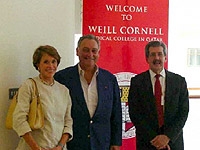
Joan and Sanford Weill with Dr. Daniel Alonso, dean of WCMC-Q.
The faculty of WCMC-Q currently includes 10 professors, all of whom have faculty appointments at Cornell University. "Eight of the faculty have previously taught at Cornell. In addition, we have three teaching assistants who graduated from Cornell this past May. They are helping our pre-medical students to adapt to the Cornell system and are serving as mentors in the pre-medical sciences," said WCMC-Q dean Dr. Daniel Alonso.
Currently housed in temporary quarters in Education City, WCMC-Q will move into its permanent quarters, a state-of-the-art medical education facility, when construction is completed next year. The Medical College will be a central feature of Education City, which will include several graduate and professional schools as well as schools for students of all ages, from prekindergarten to postgraduate students.
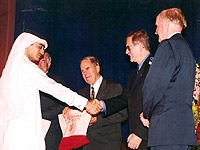
Greeting students at WCMC-Q's Opening Exercises on Sept. 2 are (from right) Dr. David Robertshaw, associate dean for pre-medical education, and members of the faculty in the Pre-Medical Program Dr. Thomas Rishel, Dr. Antonie Blackler and Dr. Terrence Murphy.
Weill Cornell Honors Emir with Naming of Research Building in New York:
In recognition of the extraordinary vision of the Emir of Qatar in creating the Qatar Foundation for Education, Science and Community Development, which spearheaded the establishment of Weill Cornell Medical College in Qatar, Weill Cornell has named in the Emir's honor a research building at the New York campus. Formerly known as the "S" building, the new name is the Hamad bin Khalifa Biomedical Research Building.
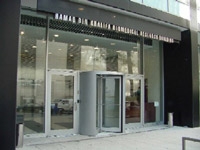
Entrance to the Hamad bin Khalifa Biomedical Research Building at Weill Cornell in New York.
For more information about Weill Cornell Medical College in Qatar, go to the WCMC-Q Web site: www.med.cornell.edu/qatar. --------

